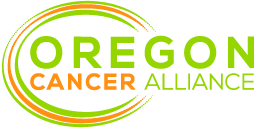At Avanté Surgical in Eugene, surgeon Kristian Ferry understands that it takes a highly qualified team of providers to successfully treat cancer.
“In many cases, cancer is really a complex and difficult problem to solve. Success really comes from a multipronged approach to treatment,” he says.
Someone diagnosed with cancer will typically see many specialists, from diagnosis through treatment and recovery. In large research hospitals or medical centers, those specialists are often under the same roof; however, that’s not usually the case in the Eugene-Springfield area. The Oregon Cancer Alliance was formed to create a virtual roof for physicians, making it easier for more than a dozen specialty clinics to work together to optimize care for patients.
“We can talk about the nuances of a patient’s particular disease and the benefits of a particular therapy for that person,” says Dr. Nathan Christensen, an ear nose and throat surgeon with PeaceHealth. “As members of the OCA, we can have a meaningful, real-time conversation, which I think definitely enhances the treatment patients receive.”
Oregon Medical Group radiologist Dr. Michael Milstein says, “When I talk with patients and tell them, ‘Yes, you have cancer,’ I can also say, ‘Here’s the next step. This is exactly what’s going to happen.’ It’s very nice to have these pathways, where we know exactly where patients are going to go and how they are going to be taken care of.”
Collaboration leads to better care
As members of the Oregon Cancer Alliance, providers commit to attending tumor boards, where specialists discuss individual cancer cases and collaborate on the best treatment plan for each patient. Due to the pandemic, in-person tumor board meetings have been replaced with virtual meetings, allowing the collaboration to continue.
Dr. Michelle Niesley is a naturopathic doctor who specializes in oncology at Pacific Integrative Oncology in Eugene. She says: “The Oregon Cancer Alliance really provides patients with a group of physicians and providers who are dedicated to excellent communication amongst one another and really providing the patient with the most comprehensive care possible.”
The OCA also utilizes patient navigators within each clinic to help coordinate a patient’s appointments between providers, making their experience as seamless as possible.
“We can ensure that appointments are made on a timely basis, that patients get from point A to point B, so that we don’t lose time,” says medical oncologist Dr. Marc Uemura with Willamette Valley Cancer Institute. “Our number one goal in all of this is to improve our patients’ outcomes.”
